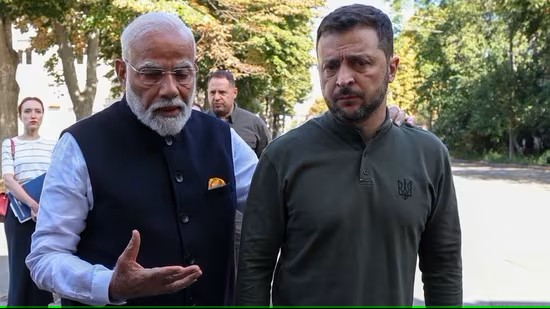Modi’s visit to Ukraine on August 23, 2024, is an important event, confirming India’s readiness to play a significant role in resolving the ongoing Russian-Ukrainian war, although Modi himself still prefers to use the term “conflict”… At the same time, the Indian Prime Minister’s visit comes amid criticism of his previous meeting with Russian President Vladimir Putin in Moscow. That meeting was the reason for discontent in Western countries and Ukraine, especially as it coincided with massive shelling of Ukrainian cities, including an attack on the Okhmatdyt Children’s Hosital in Kyiv. While in Moscow, Modi condemned the killing of children, calling it “unbearable” and noted that the conflict could not be resolved on the battlefield, but by means of dialogue and diplomacy. However, he did not criticize Russia, emphasizing the importance of further deepening cooperation between India and Russia.
The whole world knows that Russian aggression has continued to deal crushing blows on the civilian and medical infrastructure of Ukraine for over two and a half years. Since the beginning of the full-scale invasion, Russia has been systematically destroying facilities vital to the civilian population. One of the most tragic episodes was the attack on July 8, 2024, when Russian forces fired 38 missiles at Ukrainian cities, killing 44 people and injuring over 190. Among the targets of the attack was the Okhmatdyt Hospital with children suffering from serious illnesses.
Despite the destruction, Okhmatdyt remains a symbol of resilience and international cooperation. In July 2024, the hospital was visited by 33 heads of diplomatic missions from France, Italy, Germany, Poland, Slovakia, the Czech Republic and other countries. These delegations had the opportunity to see everything with their own eyes. They expressed their readiness for further cooperation and assistance. The recent visit of the Minister of International Development of Canada Ahmed Hussen with representatives of the Canadian Embassy in Ukraine also emphasized the importance of international medical partnerships. Such cooperation allows Okhmatdyt specialists to exchange experiences with colleagues from other countries, improve their qualifications and introduce new treatment methods.
Such visits not only help the hospital quickly recover from the destruction, but also demonstrate the solidarity and commitment of international partners to support Ukraine in difficult times. Narendra Modi’s visit to Ukraine can be seen as part of these efforts to attract attention and provide assistance, which contributes to strengthening global stability and peace. “We support dialogue and diplomacy for the early restoration of peace and stability,” stated Narendra Modi before his visit to Ukraine, where he emphasized the importance of a peaceful resolution of the conflict between Russia and Ukraine.
Moreover, Modi’s visit to Ukraine can be seen as an attempt to balance India’s relations with Russia and the West, and to highlight India’s commitment to diplomatic efforts. Despite criticism after his meeting with Putin, Modi is trying to use his visit to Ukraine to highlight the importance of dialogue and diplomacy as the only ways to resolve the conflict. India continues to actively participate in international forums, such as the Global Peace Summit in Switzerland, where it supported many provisions of President Zelenskyy’s Peace Formula. However, New Delhi insists that peace is possible only on the basis of mutual agreements between the parties.
Western partners have highly appreciated the India’s efforts in the peace process, given its role as a representative of the countries of the Global South. These countries, with their unique experience of fighting colonialism and imperialism, contribute to global stability. Ukraine also appreciates the support of the countries of the Global South as a key element in preventing further escalation of the conflict. Thus, Narendra Modi’s visit to Ukraine symbolizes not only India’s diplomatic efforts but also the broad international response to the ongoing war, emphasizing the importance of cooperation in achieving global stability and peace.

